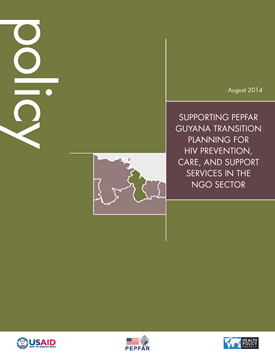The Health Policy Project ended in 2016. Work continued under Health Policy Plus (HP+) until 2022.
PUBLICATION
Author(s): Anita Datar, Priya Iyer, Shaundell Shipley
Primary Language: English
Date: 8/1/2014
Abstract:
The United States Agency for International Development (USAID) supports the implementation of the United States President’s Emergency Plan for AIDS Relief (PEPFAR), a United States government (USG) initiative to save the lives of people around the world who are suffering from HIV and AIDS, in almost 100 countries. Since 2003, PEPFAR has worked with these countries to create systems that have stabilized the HIV epidemic by preventing new infections and providing care, support, and treatment to those infected and affected by HIV. Due to the progress that has been made in Guyana, the PEPFAR program will transition from a service delivery model to one that provides targeted technical assistance over the next five years (2013–2017). This will also result in a shift in USG funding, inclusive of USAID.
Within this context, there is an identified need to clearly define roles and responsibilities for all key stakeholders and delineate next steps in the transition to ensure long-term sustainability of HIV prevention, care, and support services and the continuum of care for people infected and affected by HIV and AIDS. Toward this effort, the USAID- and PEPFAR-funded Health Policy Project (HPP) supported PEPFAR Guyana by conducting a high-level assessment of HIV and AIDS NGOs, relevant private sector entities, the Ministry of Health (MOH), the National AIDS Program Secretariat (NAPS), and other relevant line ministries in Guyana. The aim of this assessment was to document the country’s capacity gaps and needs to support the transition of HIV services from donors to the country, and suggest approaches for ensuring an ethical transition and sustainability of these services over time.
Civil Society Engagement Governance, Stewardship & Accountability (GS&A) HIV Non-Government/Community Service Org. (NGO/CSO) Stakeholder Engagement Caribbean Region LAC


